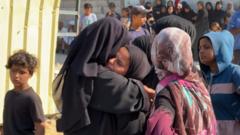The UN and humanitarian officials warn of escalating malnutrition and hunger as aid delivery struggles continue, while Israeli leadership asserts their efforts to alleviate the crisis.
**Gaza's Humanitarian Crisis Deepens Amid Ongoing Conflict, Trump Claims Starvation**

**Gaza's Humanitarian Crisis Deepens Amid Ongoing Conflict, Trump Claims Starvation**
Former US President Donald Trump highlights the severe humanitarian situation in Gaza, contradicting Israeli claims of no starvation amid ongoing military operations and limited aid.
In recent statements, former President Donald Trump expressed grave concerns about the humanitarian situation in Gaza, calling it a case of "real starvation." This comment directly contested Israeli Prime Minister Benjamin Netanyahu's assertion that there is no starvation in the region. Speaking at a meeting with UK Prime Minister Keir Starmer in Scotland, Trump highlighted the plight of children in Gaza, stating, "Those children look very hungry... that's real starvation stuff."
Trump's remarks came on the heels of a report from Tom Fletcher, the UN humanitarian chief, who indicated that while some humanitarian efforts had been made, they fall significantly short of what is required to address the acute food shortages in Gaza. Fletcher underscored that vast amounts of food and aid are necessary to prevent starvation, noting the importance of accelerated and large-scale delivery of supplies.
In recent developments, the Israeli government reported that around 120 truckloads of aid were received in Gaza on Sunday during a temporary halt in military operations designed to facilitate humanitarian assistance. Countries like Jordan and the United Arab Emirates also contributed by airdropping food packages. Despite these efforts, the UN cited that the total assistance thus far has been negligible compared to the scale of the need on the ground.
The health ministry in Gaza, managed by Hamas, reported that malnutrition-related deaths have continued to climb, stating that at least 14 additional individuals succumbed to malnutrition in the past day, bringing the total to 147 since the onset of hostilities in October 2023. This figure includes 88 children, reflecting the dire consequences of the ongoing conflict on vulnerable populations.
While Israel insists that it is facilitating aid deliveries and denies responsibility for food shortages, humanitarian organizations have criticized the effectiveness and safety of the aid delivery methods employed. Fletcher lamented that many UN food trucks were looted shortly after entering Gaza, attributing this theft to "desperate individuals" facing starvation, indicating the intense need within the civilian population.
Escalating tensions continue to complicate the humanitarian crisis, highlighted by the Israeli military's claims of combating Hamas while attempting to provide humanitarian pauses for aid access. Nonetheless, Fletcher and other humanitarian advocates call for a sustained and comprehensive ceasefire to truly address and resolve the horrendous living conditions in Gaza.
The World Health Organization has labeled the situation as "dangerous" with rising malnutrition rates, indicating that much of the suffering and loss of life is avoidable. The UN also directed criticism toward systemic barriers preventing adequate aid from reaching civilians, emphasizing that the current measures are insufficient and that long-term solutions are essential for alleviating this humanitarian disaster.
As the international community watches closely, the discord between Israeli authorities and humanitarian organizations continues to grow, with calls for accountability and a cohesive strategy to address the ongoing crisis in Gaza remaining critical amidst rising death tolls and suffering among the populace.
Trump's remarks came on the heels of a report from Tom Fletcher, the UN humanitarian chief, who indicated that while some humanitarian efforts had been made, they fall significantly short of what is required to address the acute food shortages in Gaza. Fletcher underscored that vast amounts of food and aid are necessary to prevent starvation, noting the importance of accelerated and large-scale delivery of supplies.
In recent developments, the Israeli government reported that around 120 truckloads of aid were received in Gaza on Sunday during a temporary halt in military operations designed to facilitate humanitarian assistance. Countries like Jordan and the United Arab Emirates also contributed by airdropping food packages. Despite these efforts, the UN cited that the total assistance thus far has been negligible compared to the scale of the need on the ground.
The health ministry in Gaza, managed by Hamas, reported that malnutrition-related deaths have continued to climb, stating that at least 14 additional individuals succumbed to malnutrition in the past day, bringing the total to 147 since the onset of hostilities in October 2023. This figure includes 88 children, reflecting the dire consequences of the ongoing conflict on vulnerable populations.
While Israel insists that it is facilitating aid deliveries and denies responsibility for food shortages, humanitarian organizations have criticized the effectiveness and safety of the aid delivery methods employed. Fletcher lamented that many UN food trucks were looted shortly after entering Gaza, attributing this theft to "desperate individuals" facing starvation, indicating the intense need within the civilian population.
Escalating tensions continue to complicate the humanitarian crisis, highlighted by the Israeli military's claims of combating Hamas while attempting to provide humanitarian pauses for aid access. Nonetheless, Fletcher and other humanitarian advocates call for a sustained and comprehensive ceasefire to truly address and resolve the horrendous living conditions in Gaza.
The World Health Organization has labeled the situation as "dangerous" with rising malnutrition rates, indicating that much of the suffering and loss of life is avoidable. The UN also directed criticism toward systemic barriers preventing adequate aid from reaching civilians, emphasizing that the current measures are insufficient and that long-term solutions are essential for alleviating this humanitarian disaster.
As the international community watches closely, the discord between Israeli authorities and humanitarian organizations continues to grow, with calls for accountability and a cohesive strategy to address the ongoing crisis in Gaza remaining critical amidst rising death tolls and suffering among the populace.



















